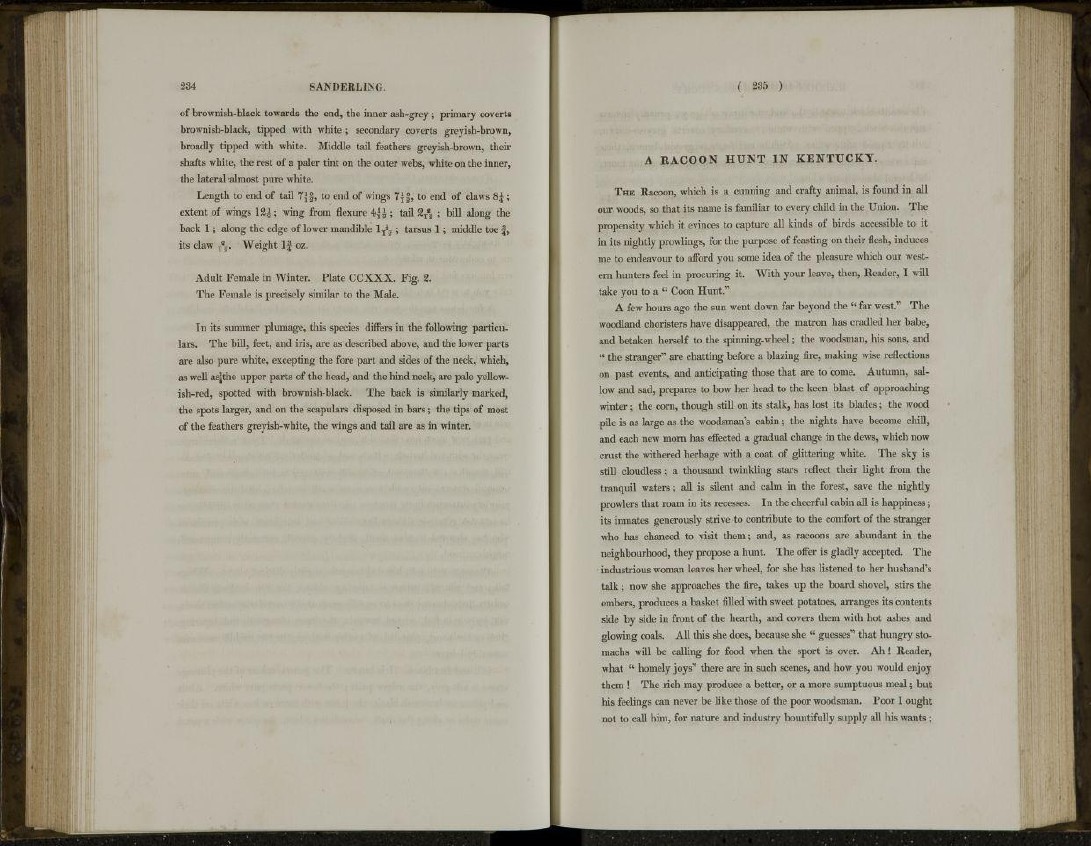
234 SANDERLING.
of brownish-black towards the end, the inner ash-grey ; primary coverts
brownish-black, tipped with white ; secondary coverts greyish-brown,
broadly tipped with white. Middle tail feathers greyish-brown, their
shafts white, the rest of a paler tint on the outer webs, white on the inner,
the lateral almost pure white.
Length to end of tail 7-J§, to end of wings 7£§, to end of claws 8£;
extent of wings 12^; wing from flexure 4££ ; tail 2T*2 ; bill along the
back 1 ; along the edge of lower mandible 1 ^ ; tarsus 1; middle toe f,
its claw ft'. Weight If oz.
Adult Female in Winter. Plate CCXXX. Fig. 2.
The Female is precisely similar to the Male.
In its summer plumage, this species differs in the following particulars.
The bill, feet, and iris, are as described above, and the lower parts
are also pure white, excepting the fore part and sides of the neck, which,
as well as^the upper parts of the head, and the hind neck, are pale yellowish
red, spotted with brownish-black. The back is similarly marked,
the spots larger, and on the scapulars disposed in bars; the tips of most
of the feathers greyish-white, the wings and tail are as in winter.
( 235 )
A RACOON HUNT IN KENTUCKY.
THE Racoon, which is a cunning and crafty animal, is found in all
our woods, so that its name is familiar to every child in the Union. The
propensity which it evinces to capture all kinds of birds accessible to it
in its nightly prowlings, for the purpose of feasting on their flesh, induces
me to endeavour to afford you some idea of the pleasure which our western
hunters feel in procuring it. With your leave, then, Reader, I will
take you to a " Coon Hunt.'1
A few hours ago the sun went down far beyond the " far west." The
woodland choristers have disappeared, the matron has cradled her babe,
and betaken herself to the spinning-wheel; the woodsman, his sons, and
" the stranger" are chatting before a blazing fire, making wise reflections
on past events, and anticipating those that are to come. Autumn, sallow
and sad, prepares to bow her head to the keen blast of approaching
winter; the corn, though still on its stalk, has lost its blades; the wood
pile is as large as the woodsman's cabin; the nights have become chill,
and each new morn has effected a gradual change in the dews, which now
crust the withered herbage with a coat of glittering white. The sky is
still cloudless; a thousand twinkling stars reflect their light*from the
tranquil waters; all is silent and calm in the forest, save the nightly
prowlers that roam in its recesses. In the cheerful cabin all is happiness;
its inmates generously strive to contribute to the comfort of the stranger
who has chanced to visit them; and, as racoons are abundant in the
neighbourhood, they propose a hunt. The offer is gladly accepted. The
industrious woman leaves her wheel, for she has listened to her husband's
talk; now she approaches the fire, takes up the board shovel, stirs the
embers, produces a basket filled with sweet potatoes, arranges its contents
side by side in front of the hearth, and covers them with hot ashes and
glowing coals. All this she does, because she " guesses" that hungry stomachs
will be calling for food when the sport is over. Ah ! Reader,
what " homely joys" there are in such scenes, and how you would enjoy
them ! The rich may produce a better, or a more sumptuous meal; but
his feelings can never be like those of the poor woodsman. Poor I ought
not to call him, for nature and industry bountifully supply all his wants ;